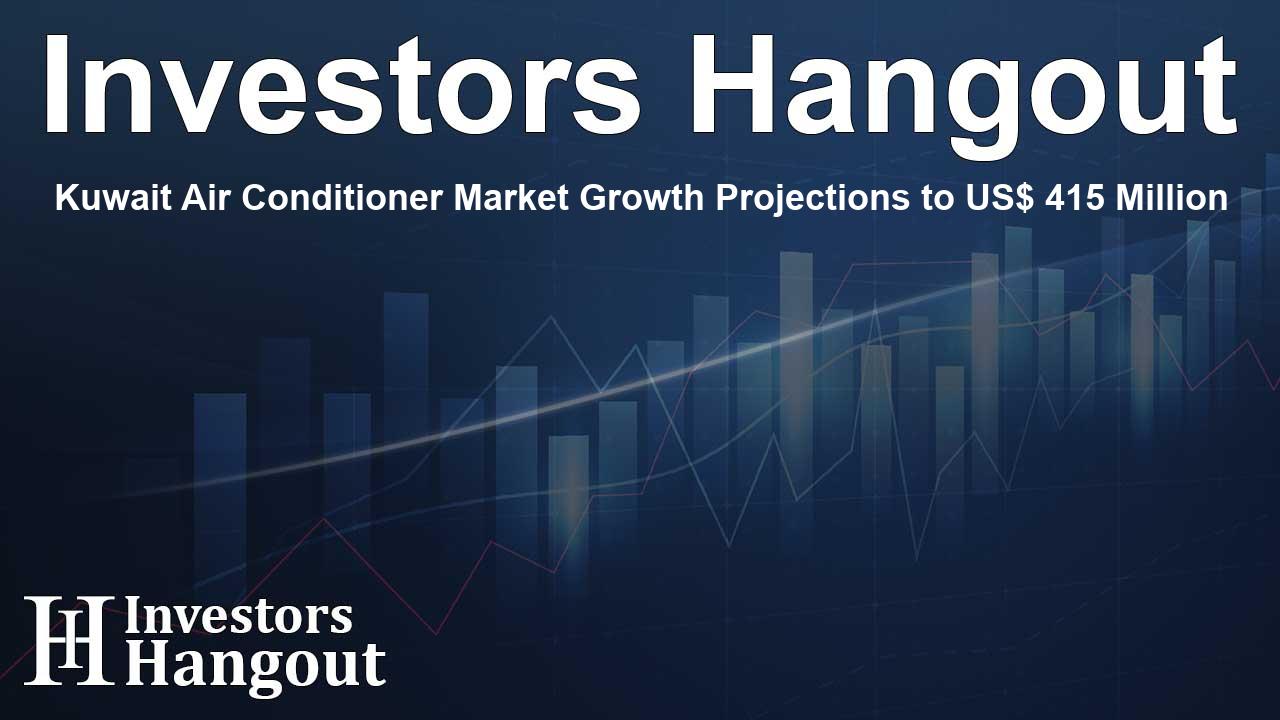Kuwait Air Conditioner Market Growth Projections to US$ 415 Million

Kuwait Air Conditioner Market Growth Projections
New research indicates that the air conditioner market in Kuwait, valued at approximately US$ 271.28 million, is poised for significant growth. Forecasts suggest a rise to US$ 415.90 million by 2033, representing a compound annual growth rate (CAGR) of 4.95% during the period from 2025 to 2033.
Kuwait's climate is a major factor driving this demand. The country experiences extreme heat, often exceeding 45°C, necessitating the use of air conditioning for indoor comfort and safety. In fact, air conditioning accounts for around 67% of the country's total energy consumption, underlining its vital role.
Market Dynamics and Energy Consumption
Energy consumption during peak summer days highlights the reliance on air conditioning systems, with residential areas using 58.4% of the total delivered electrical energy for cooling. Notably, air conditioners contribute to 75% of peak electric energy usage, presenting an opportunity for the introduction of energy-efficient models that can alleviate some of this demand.
Current Trends and Technologies
The Kuwaiti market is witnessing a shift towards energy-efficient and eco-friendly air conditioning solutions. Consumers are increasingly seeking smart technology features, such as remote control and monitoring, willing to pay more for advanced models. This transition toward efficiency is reflected in the growing popularity of inverter air conditioning systems, which significantly reduce energy consumption compared to conventional models.
Growth Drivers and Consumer Preferences
Several key drivers are evident in the air conditioner market's trajectory. Urbanization and infrastructure development are fueling demand in both residential and commercial sectors, while the government’s commitment to promoting energy-efficient technologies through mandatory energy labeling has helped shape consumer purchasing decisions.
The Future of Air Conditioning in Kuwait
Market projections suggest an optimistic growth outlook for air conditioning manufacturers, with a CAGR of around 3% up until 2028, and potentially even higher rates through 2030. This aligns well with Kuwait’s diversification goals and increasing disposable income among its residents. As the demand grows, manufacturers are expected to innovate continuously, focusing on energy-efficient products that resonate with consumer preferences.
Regulatory Landscape and Sustainability Initiatives
The government has implemented several initiatives aimed at fostering a sustainable air conditioning market. The enforcement of new energy efficiency regulations mandates compliance for all air conditioners imported into the country, aiming to phase out less efficient technologies. For instance, regulations banning non-inverter units are driving the market towards more energy-saving options.
Economic Stability and Construction Trends
The strong economic foundation provided by Kuwait’s oil wealth allows for substantial investments in infrastructure, further stimulating the HVAC (heating, ventilation, and air conditioning) market. These investments are particularly evident in ongoing and upcoming construction projects, which require advanced HVAC systems that meet modern energy conservation standards.
Competitive Landscape
The competitive landscape of Kuwait’s air conditioner market is fragmented, encompassing both global and regional players. Companies like Daikin, Carrier, and Samsung compete actively, focusing on product innovations and strategic partnerships to maintain market share. The emphasis is on creating environmentally friendly products while adapting to changing consumer trends.
Conclusion
In summary, the air conditioner market in Kuwait is poised for significant growth driven by a mixture of climate necessity, consumer preference for energy-efficiency, and supportive government initiatives aimed at promoting sustainable practices. As demand increases, manufacturers will need to prioritize innovation to stay ahead in the evolving marketplace.
Frequently Asked Questions
What factors drive the growth of the air conditioner market in Kuwait?
The extreme climate, urbanization, and rising energy costs drive demand for air conditioning systems in Kuwait.
How significant is the energy consumption of air conditioning in Kuwait?
Air conditioning accounts for about 67% of Kuwait's total energy consumption, highlighting its importance.
What trends are influencing consumer preferences for air conditioners?
There is a growing preference for energy-efficient, eco-friendly products and smart technology features.
What role does the government play in the air conditioner market?
The Kuwaiti government enforces energy efficiency regulations, encouraging the development of advanced cooling technologies.
What are the prospects for air conditioning manufacturers in Kuwait?
The market is expected to grow significantly, offering opportunities for innovation and investment as demand rises.
About The Author
Contact Olivia Taylor privately here. Or send an email with ATTN: Olivia Taylor as the subject to contact@investorshangout.com.
About Investors Hangout
Investors Hangout is a leading online stock forum for financial discussion and learning, offering a wide range of free tools and resources. It draws in traders of all levels, who exchange market knowledge, investigate trading tactics, and keep an eye on industry developments in real time. Featuring financial articles, stock message boards, quotes, charts, company profiles, and live news updates. Through cooperative learning and a wealth of informational resources, it helps users from novices creating their first portfolios to experts honing their techniques. Join Investors Hangout today: https://investorshangout.com/
The content of this article is based on factual, publicly available information and does not represent legal, financial, or investment advice. Investors Hangout does not offer financial advice, and the author is not a licensed financial advisor. Consult a qualified advisor before making any financial or investment decisions based on this article. This article should not be considered advice to purchase, sell, or hold any securities or other investments. If any of the material provided here is inaccurate, please contact us for corrections.
